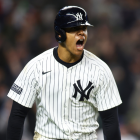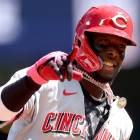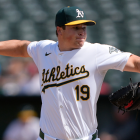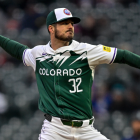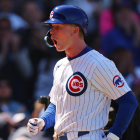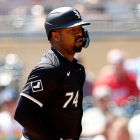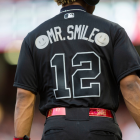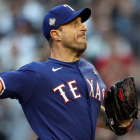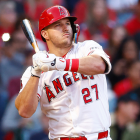Saturday afternoon at Fenway Park the Yankees and Red Sox played a marathon 16-inning game that saw the Yankees walk away with a win (NYY 4, BOS 1). Matt Holliday hit a game-tying home run against Craig Kimbrel in the ninth to force extra innings.
Two innings later Holliday was at the center of a weird play at first base. He was on first base when Jacoby Ellsbury hit a ground ball to first baseman Mitch Moreland. Moreland threw to second to start the 3-6-3 double play, though rather head down to second base, Holliday retreated to first and interfered with Moreland trying to catch the return throw.
Holliday was forced out at second base but Ellsbury was ruled safe at first. Interference is not a reviewable play, so Red Sox manager John Farrell argued, and the umpires even got on the horn with the crew in New York for a rules clarification. When it was all said and done, no interference was called and Ellsbury was allowed to remain at first base. Here's the play:
Farrell and Red Sox formally protested the interference non-call because they don't want Holliday and the Yankees to try something like that again. Scott Lauber of ESPN has the details:
"I still firmly believe there was interference on the play," Farrell said Sunday before the Red Sox split a day-night doubleheader against the Yankees at Fenway Park. "If it goes unaddressed or goes without any kind of further attention brought to it, who's to say you can't instruct runners to do the same going forward?
"If there was no interference, [Moreland] would've had access to the bag. He was taken out of it by the returning runner [Holliday]."
Alas, the protest was denied Monday afternoon.
Farrell said protest denied. Said he's disappointed play was not reviewable, would like it all reviewable.
— Evan Drellich (@EvanDrellich) July 17, 2017
Had the protest been upheld, the game would have been replayed from the point of the play. Ellsbury would have presumably been ruled out at first base on the interference play and the game would have continued from that point in the 11th inning.
Following Saturday's game Holliday told reporters he retreated back to first because he thought Moreland stepped on first base for the force out rather than attempt the 3-6-3 double play with the speedy Ellsbury running. Once he saw the throw go down to second, Holliday went back to first base rather than run into what he thought was a tag play at second. Sounds ... plausible? I guess.
Either way, the Red Sox moved forward with the protest and were denied Monday. The odds of the protest being upheld were very small anyway. For starters, the play had no impact on the outcome of the game. Ellsbury was allowed to remain at first base, but the Red Sox escaped the inning without allowing a run and the game continued.
Secondly, the interference rule is (intentionally) vague and open to interpretation. It would have been tough to argue the rule was clearly broken. Still, the Red Sox sent a message to Holliday and the Yankees that they didn't like the play, and they don't want them doing it again.
The last upheld protest in MLB was fairly recent. It happened in 2014 due to a rain delay issue. There are only 15 upheld protests on record and only one in the AL, the George Brett pine tar game against the Yankees in 1983.














